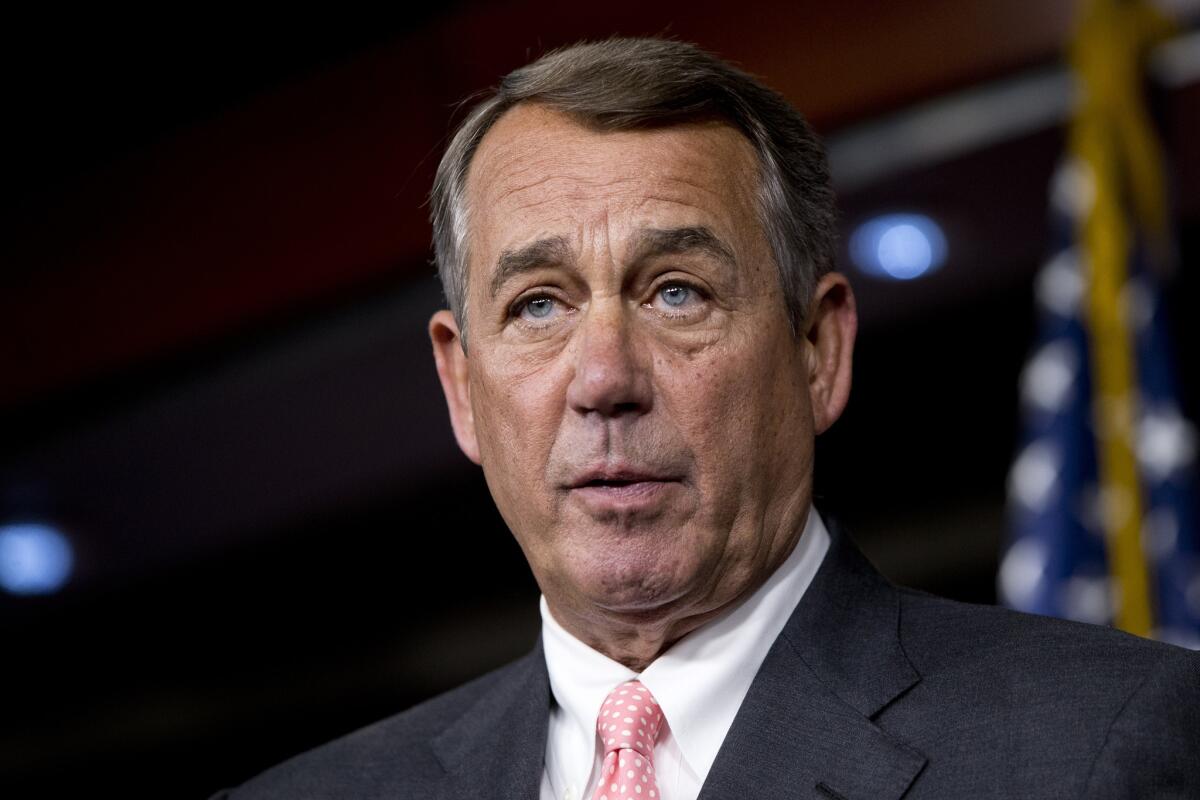Speaker John Boehner seeks compromise with Democrats over raising the debt limit

House Speaker John A. Boehner of Ohio speaks on Capitol Hill in Washington.
Reporting from Washington — House Speaker John A. Boehner has lowered expectations for reaching a sweeping budget deal with the White House and instead is focusing on the more immediate task of averting a looming showdown over the debt ceiling.
Raising the debt limit has become one of the most difficult votes for Republicans in Washington, and the Nov. 3 deadline raises the risk of a federal credit default if Congress fails to act.
Boehner (R-Ohio), who hopes to retire at the end of the month, has signaled he is prepared to abandon the demands of his party’s conservatives by considering a straightforward bill that Democrats would support. Conservatives would rather he try to extract GOP concessions from the White House in exchange for Republican votes.
Reaching a deal with Democrats would infuriate conservative GOP lawmakers who prefer a fight, but it shows the speaker no longer feels beholden to the party’s hard-right flank, which forced his early retirement.
“The speaker has made it clear that he wants to solve some outstanding issues before he leaves,” said a Boehner aide, who was not authorized to discuss the private deliberations. “No decisions have been made, but a resolution on the debt ceiling is certainly possible.”
In the Senate, GOP Majority Leader Mitch McConnell of Kentucky said Tuesday the “preference” was not to simply raise the debt ceiling on its own; but he declined to offer an alternative and said the Senate would “wait and see how the House deals with this.”
Treasury Secretary Jacob J. Lew has warned Congress not to wait until the deadline to act.
As the debt limit was reached earlier this year, the Treasury Department suspended the issuance of some securities, and has instead been juggling its accounts with “extraordinary measures” to finance the government on a temporary basis and pay the bills.
By November, though, the money is expected to run out, risking a federal default on already accrued obligations.
Democrats are warning Republicans not to risk another credit downgrade, as happened four years ago when the then-new majority pushed the borrowing deadline to the brink.
“It’s time for Republicans to end their calendar of chaos,” Minority Leader Nancy Pelosi (D-San Francisco) said. “Republicans should bring forward a clean bill to honor the full faith and credit of the United States immediately.”
The Republican majority has not been able to pass a debt ceiling increase without the help of Democrats since the GOP swept to power in the 2010 tea party wave.
At the time, deficits skyrocketed, pushing the debt load upward, as tax revenue plummeted during the Great Recession and federal spending increased to shore up the economy.
Debt already had doubled during President George W. Bush’s administration, and it shot up further under President Obama.
Many Republicans campaigned against raising the debt limit and have tried to force spending cuts in exchange for new borrowing.
A pivotal debt ceiling showdown in 2011 resulted in Standard & Poor’s downgrading the United States’ AAA credit rating and higher borrowing costs.
But it also produced a compromise with Obama that led to the so-called “sequester” cuts, which were part of Boehner’s insistence that every $1 of new debt be offset by the same amount of cuts.
Over time, both Republicans and Democrats have balked at the severity of those reductions. Republicans oppose the military cuts; Democrats resist the reductions in social programs and infrastructure investments.
Talks have been underway between the White House and congressional leaders for the past several weeks on a new budget compromise, but they remain far apart.
Boehner had hoped to “clean up the barn” before his planned Oct. 30 retirement, raising the prospect that the beleaguered speaker would break the logjam on the sequester and other key issues pending before Congress.
But as the economy has improved and deficits have fallen, the $18.1-trillion debt has somewhat subsided as a dominant issue, and talks over a budget deal have dragged on.
At the same time, the GOP’s internal leadership scramble has left Boehner’s departure date uncertain. The top candidate to replace Boehner, Rep. Paul D. Ryan (R-Wis.) is facing a power struggle with members of the renegade House Freedom Caucus who are withholding their support. Boehner vowed to stick around until a new speaker is chosen.
For Boehner, dispatching with the debt ceiling issue remains a tall order for the Republican speaker, even with Democratic help. The last time the GOP-led House approved a change to the debt ceiling, in 2014, 28 Republicans voted for it — and 199 voted against.
For the latest from Congress and the 2016 campaign, follow @LisaMascaro
For more, go to www.latimes.com/politics
MORE ON THE DEBT LIMIT
As debt limit deadline nears, Lew worries about ‘terrible’ accident
Column: The U.S. government should stay in debt, and here’s why
More to Read
Get the L.A. Times Politics newsletter
Deeply reported insights into legislation, politics and policy from Sacramento, Washington and beyond. In your inbox three times per week.
You may occasionally receive promotional content from the Los Angeles Times.











